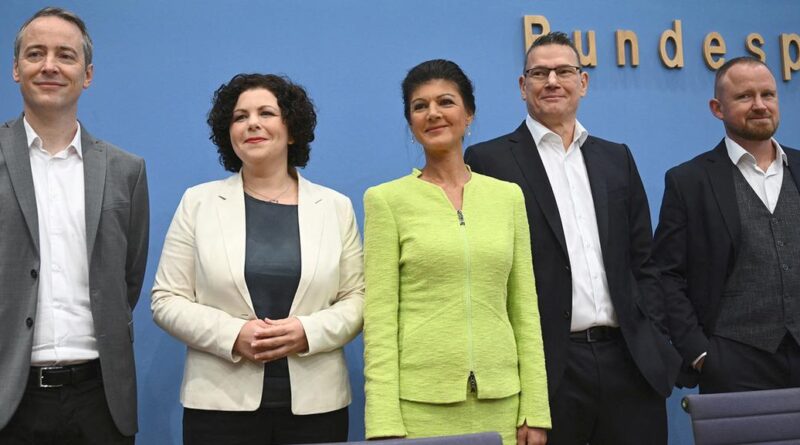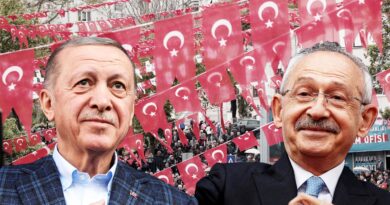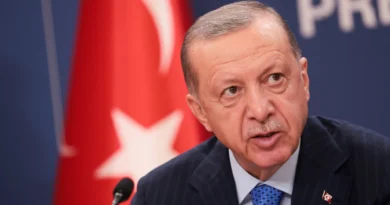A specter is haunting Europe, the specter of Sahra Wagenknecht
PASCUAL SERRANO
A piece of news from last October 23 that may be relevant for the European left went very unnoticed in Spain. Nine MEPs, led by the German MP Sahra Wagenknecht, left the political party Die Linke, which means losing the parliamentary group in the Bundestag. The split deputies create a new party, which will be called the Sahra Wagenknecht Alliance for Reason and Justice (BSW in German), with which they will run in the next European elections, next year.
At document in which they announce their departure give some reasons:
They accuse the current institutional left of “focusing on urban environments, young people and activists” and moving away from “traditional voters.” That is, workers, union members and rural population. Which, in his opinion, has “resulted in the party having less and less success among voters.”
They also denounce “the military course of the German government”, supported by the institutional left: “"German foreign policy provides ammunition for wars instead of seeking peaceful solutions."
They consider that in the current structure of their institutional left party there is a clear “narrowness of the accepted channels of opinion.” And that this party “no longer appears as a clearly recognizable opposition, but rather as a watered-down party of “yes, but…”.”
Hence, they take a step towards the creation of “a new political force, a democratic voice for social justice, peace, reason and freedom.”
Although the debate and the news were already an open secret, the document in which they announced their departure and reasons It was published in the Junge Welt newspaper, the historic newspaper of the communist youth of the former East Germany, which showed the clear leftist line of the new project. Let's not forget that Wagenknecht grew up in the German Democratic Republic and wrote his thesis on a young Karl Marx's interpretation of Hegel.
That there is a split on the left is nothing exceptional, the novelty of this is that the exit is to the left, it is led by politicians as charismatic as the deputy Sahra Wagenknecht (she was vice president of the party and is the wife of the historic leftist leader Oskar Lafontaine) and the polls give her a voting intention of up to 14%, which would mean fourth place, only behind the Christian Democrats of the CDU , the ultras of the AfD and hot on the heels of the social democrats of the SPD. Two in ten Germans say they can imagine giving her support. Die Linke did not reach 5% in the last general election in 2021 and has now just lost all its deputies in the elections in Hesse and Bavaria.
The exit document and the numerous declarations and positions of Wagenknecht allow us to appreciate that his ideology represents a break with the elements of the current urban and young left that dominates the European institutional panorama and in much of Latin America: identity cultural wars, discussions about gender and sexual orientation, ideology Woke, acceptance of NATO's militaristic policies in Ukraine, sympathies for Biden and goodwill towards an emigration of refugees caused precisely by the wars and aggressions that this left does not criticize (or even support) in Libya, Syria, Lebanon or Yemen.
Given all this, the new German movement proposes a return to traditionally left-wing values, focused on the defense of workers and the redistribution of wealth, clear opposition to NATO and the shipment of weapons to Ukraine, the end of sanctions against Russia and a much more restrictive immigration policy, because they understand that it is not the way to improve the future of the countries from which they come or of German workers. It is for all this that his support draws from the entire German political spectrum, from his former colleagues in Die Linke, to the far-right AfD, but also from the great SPD and CDU. For the European elections in six months, the polls give him 20% of the votes, a revolution.
It must be recognized that they are making it easy for Wagenknecht in Germany. Its economy has been in recession since mid-2023 and has barely recovered its pre-pandemic GDP due to the sanctions imposed on Russia, which have left it without energy sources at the price it had before and, therefore, have left its industrial competitiveness affected. . Only in recent days have news emerged that Bosch will lay off 1.500 workers y Michelin another similar figure. The Spanish press has even collected the serious situation of the children of Spanish emigrants who arrived in Germany in the sixties and seventies, and who are now being laid off. Added to all this is that Germany has been the country most open to receiving refugees from the wars caused by NATO and the West (Syria, Libya or Afghanistan), something that many workers, a traditional fishing ground for the left, have interpreted as a supply of labor that pushed down their working conditions.
To this we must add the current wars, where Germany is one of the most involved and affected countries, without German citizens being able to understand the reason for their participation, beyond a humiliating following of the United States. As humiliating as the sabotage of the Nord Stream gas pipelines, which provided cheap Russian energy to German industry and which no one can ignore the hand of the American “friend” behind with the submissive silence of the German governments. And to make matters worse, the German leadership in sending weapons to Ukraine, even now more diligently than the United States. Very cleverly, Wagenknecht has linked the problems of manufacturing and supplying medicines in Germany to the diversion of industrial resources to arms for Ukraine: “What kind of perverse policy is this, which is causing the abandonment of children and cancer, but the European production of deadly weapons with billions of euros is necessary immediately. I believe that we should finally take care of a health system that puts decent care of the sick at the center and that builds the production of domestic medicine, instead of prolonging a terrible war without fulfilling the supply of weapons and ammunition.”
Something similar has happened with the Gaza war, where the German government, in its obsession with pro-Israeli merits, has gone so far as to prohibit peaceful demonstrations of solidarity with the Palestinians and even the land of Saxony-Anhalt. announced that it will be mandatory to sign a document that expressly recognizes “Israel's right to exist” to achieve German residency. Once again international policies of following other countries that only manage to awaken the feeling of humiliation of the Germans.
It is logical that with these governmental ties, Sahra Wagenknecht's new party awakens support in a population that is experiencing waves of refugees after NATO interventions, they are involved in two wars that do not concern them and that only destroy their economy and, everything This, accepted by its institutional left, which limits its campaigns to cultural and identity wars.
Any European will observe many similarities between this German panorama and that of their country. Maybe it's just a matter of time before they appear. Sahras Wagenknecht in other countries. Already This has been pointed out by a researcher from the Elcano Royal Institute: “although your proposal addresses typically German concerns, it also reflects problems shared with the rest of the European Union. If BSW prospers, it will soon develop imitators throughout the EU.” Perhaps this is the new ghost that haunts Europe, 175 years after the communist ghost that Marx and Engels also announced from Germany. Either that, or it will be the extreme right that reaps the indignation… and the votes.
Pascual Serrano is a journalist, media analyst and writer. His last book is "Forbidden to doubt. The ten weeks in which Ukraine changed the world”













